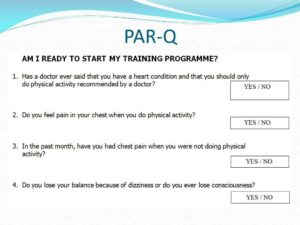Do you know what the Par-Q is? If not, you should read this blog post! The Par-Q is a questionnaire that is used to determine a person’s physical fitness level. It is also used to identify any health risks that may prevent someone from being able to participate in physical activity safely. In this blog post, we will discuss everything you need to know about the Par-Q. We will cover who should complete it, when it should be completed, and what happens if you have a positive response. Stay tuned!
Contents
What Is Par-Q?

Par-Q is a short questionnaire that is used to screen for people who should consult a doctor before becoming more physically active. The acronym “Par-Q” stands for “Physical Activity Readiness Questionnaire.” The Par-Q was developed in Canada in the early 1970s and has been widely used since then. It is one of the most popular fitness screening tools in use today.
The Par-Q consists of seven questions about your health history and current physical activity level. It takes only a few minutes to complete. The seventh question on the Par-Q is optional. It asks about your goals for becoming more physically active.
The Par-Q is not a diagnostic tool. It cannot tell you if you have a medical condition that might make physical activity dangerous for you. However, it can help you decide whether or not you need to see a doctor before becoming more physically active.
If you are not sure how to answer any of the questions on the Par-Q, you should consult a doctor before becoming more physically active.
What Is The Purpose Of Par-Q?
The purpose of the Physical Activity Readiness Questionnaire (PAR-Q) is to screen individuals before they start an exercise program. It is designed to identify those who may put themselves at risk by starting an exercise program.
The PAR-Q is administered before beginning a strenuous workout routine in order to discern whether the client has any medical conditions which might make exercise hazardous. The PAR-Q is based on information that a client provides, rather than objective measurements such as height, weight, or age.
What Questions Will Ask In Par-Q?

The set of questions that will ask in par-q are as follows:
- How often do you exercise?
- What types of physical activity do you do?
- How long have you been doing these activities?
- Do you have any health concerns that might limit your ability to participate in an exercise program?
- Are you pregnant or have given birth in the past six months?
- Do you have any joint pain or other injuries that might limit your ability to participate in an exercise program?
- Are you taking any medications that might affect your ability to participate in an exercise program?
- Would you like a physical activity partner to help motivate you and provide support?
These questions are important in order to get a general idea of an individual’s health and fitness levels. It is also important to know if the person has any conditions that might limit their ability to participate in an exercise program. The answers to these questions will help determine whether or not it is safe for a person to begin an exercise program.
What Is The Result Of Par-Q?

By answering these questions, you can get a better idea of if you’re prepared to start an exercise regimen, or how hard you should push yourself in your current program.
The Physical Activity Readiness Questionnaire (PAR-Q) is a self-screening tool used to determine. If someone is safe to begin or continue an exercise program. It is made up of seven questions. If the answer to any of the questions is “yes,” it is recommended that the individual see a doctor before starting an exercise program.
The PAR-Q was developed in order to reduce the number of people who experience adverse events while exercising. It is not a diagnostic tool but rather is meant to serve as a starting point for discussions between a potential exerciser and their healthcare provider.
The PAR-Q can be found online or in print form. It takes about five minutes to complete and can be done without a healthcare provider present.
If You Say “Yes” To Any Of The Questions On The Par-Q
If you answer “yes” to any of the questions on the PAR-Q, it is recommended that you see a doctor before starting an exercise program. This is because you may be at higher risk for experiencing an adverse event during exercise.
If You Say No To Any Of The Questions On The Par-Q
If you answered no to all of the PAR-Q questions, you can safely assume that you can exercise with little risk of having any medical complications from it. However, starting slowly and gradually progressing is still important. Getting a fitness assessment from a personal trainer or coach may also be helpful in order to determine where on your journey you should begin.
How Does Par-Q Help?
Par-Q helps in the following ways:
- Helps people to become more physically active
- Reduces the risk of injuries
- Improves overall health and fitness levels
- Can be used as a tool to assess someone’s readiness to start an exercise program
When You Have To Stop Exercise Program?
If you’re feeling pain or any sort of discomfort, it’s important to stop your exercise program and consult a doctor. This is especially true if you have any sort of underlying health condition. Additionally, if you feel faint, dizzy, or experience shortness of breath, you should also stop your program and seek medical attention.
You should always speak with your doctor before changing or starting any activity, especially if you are pregnant.
The PAR-Q is intended for use by healthy adults aged 18 years and older who do not have any medical conditions that limit their ability to participate in physical activity.
Conclusion
It may be concluded that Par-Q is a simple but important tool that can help you determine if you are healthy enough to begin or continue an exercise program. While it is not foolproof, it can give you some valuable insight into your health. Be sure to discuss any concerns with your doctor before beginning an exercise program.
Physical Therapy help patients recover from pain. If you’re experiencing Back pain, Shoulder pain, Knee pain, Neck pain, Elbow pain, Hip pain, or Arthritis pain, a physical therapist at MantraCare can help: Book a physiotherapy session.


